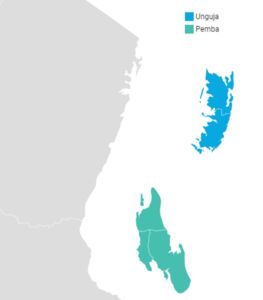Country Results
The Zanzibar Malaria Behavior Survey was fielded in June through July 2021 in conjunction with the Tanzania Malaria Behavior Survey. Zanzibar has a low transmission context that is moving towards the elimination of malaria, and a low transmission MBS was used to reflect the context and intervention implementation in Zanzibar. Survey results were analyzed in coordination with the National Malaria Control Program and will be released in 2023. The survey was carried out by the Breakthrough ACTION project in collaboration with the National Malaria Control Program, the U.S. President’s Malaria Initiative, and several other local organizations.
Study Zones

Survey Regions and Respondents
Key behaviors at a glance
50%
of respondents who had fever in the two weeks prior to the survey sought prompt and appropriate care on the same or next day of fever onset
85%
of nets found within households were used every night of the week
96%